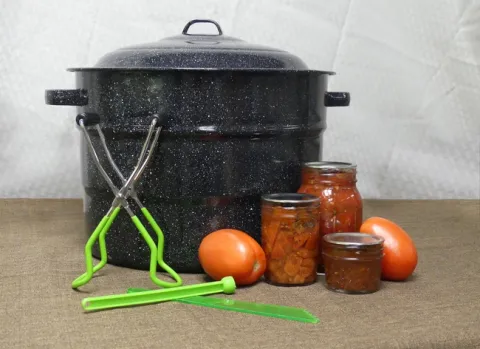
Canning Workshop
By Sarah Arana UCCE Master Food Preserver
My grandmother used to can everything but I never paid attention. Now I want to can some of the produce from my garden. Where do I start? Jane S., Paso Robles, CA
Gardens overflowing with tomatoes, cucumbers, and peppers can seem overwhelming! Backyard orchards brimming with juicy peaches, fragrant citrus, and deep purple plums can cause unnecessary waste if you can't eat them fast enough before they spoil. Learning how to preserve your bounty will enable you to enjoy these foods all year.
People have been preserving food for centuries. Early techniques included drying, smoking, fermentation and packing in fat (a method we know these days as confit). Later came vinegar pickles, jams (often sealed with wax or more fat) and suspension in alcohol. Still, none of these approaches led to reliably preserved foods. There was always some risk of spoilage or harmful bacteria developing and ruining the food and possibly making you sick.
Once produce is separated from its plant, it's perishable with a very short window of freshness. Unless produce is preserved in some way, bacteria, molds and yeasts, physical damage such as bruising, water loss, punctures; or chemical changes caused by enzymes cause it to spoil. Proper canning can prevent spoilage and preserve your harvest for this winter's table.
There are two types of home canning: boiling water canning and pressure canning. The types of food canned by using boiling water canning, are high-acid foods like fruit and pickles. Low-acid foods like vegetables, meat and seafood require pressure canning. It is imperative to use the right method for the product you are canning. To ensure the safety of food you want to preserve, it is highly recommended that you learn the proper techniques following approved food safety guidelines. One way to do that locally is to take a class offered by the UCCE Master Food Preservers of San Luis Obispo and Santa Barbara Counties. Learn how to "save the seasons" by canning fruits and vegetables from your own harvest or purchased from a farmer's market. You'll learn about boiling water canning, atmospheric steam canning, and pressure canning.
“Saving the Seasons-Introduction to Canning”
Date: April 27, 2019
Fee: $10 Time: 10:00am-12:00pm
Location: UCCE Auditorium, 2156 Sierra Way, San Luis Obispo
Please register to attend: http://ucanr.edu/savingtheseasons

